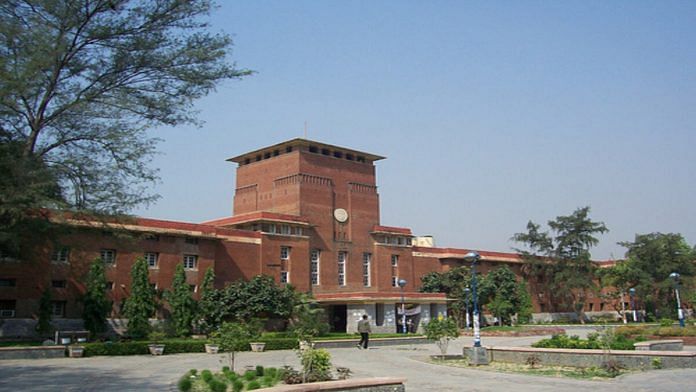New Delhi: English teachers at Delhi University (DU) fear that many could lose their jobs under the latest Undergraduate Curriculum Framework, which reduces their workload by “one-third”, ThePrint has learnt.
Teachers have claimed that about 100 ad-hoc or guest teachers across the board could lose their jobs if the decision is not reversed.
Released by Delhi University’s executive council in February this year, the Undergraduate Curriculum Framework, 2022 — which structures coursework according to the National Education Policy (NEP), 2020 — omits English as a medium for ability enhancement compulsory courses (AECC).
Previously studied for four credits, these courses covers topics such as types and theories of communication, communication skills for business, interpersonal communication, social communication, writing skills, non-verbal communication, group discussions, and public speaking.
In a public statement he issued on Facebook Sunday, Rudrashish Chakraborty, a professor at DU’s Kirori Mal College, said that the framework takes away the “compulsory English language” component in AECC, and drops the core English option in the B.A. and B.Com. programmes.
“As the reopening of the university is round the corner, there’s a clear indication that the workload of the English department across colleges is getting reduced by at least one-third owing to the removal of the courses mentioned above,” he wrote.
This risk is considerably higher for English teachers teaching the course in science colleges, Charkroborty said in his post. DU has around 800 English teachers in total, both permanent and ad-hoc, according to a professor ThePrint spoke to.
More than 400 teachers submitted a petition to Delhi University’s vice-chancellor Yogesh Singh in March this year asking the university to reverse the decision, Chakraborty said in his Facebook post. They are yet to get a response to the petition, according to teachers ThePrint spoke to.
The new framework will be implemented in the academic year 2022-23 when the university begins rolling out its four-year undergraduate programmes under the NEP.
ThePrint reached out to DU registrar Vikas Gupta over the phone. The report will be updated if and when he responds.
However, in a statement to The Indian Express in January this year, Gupta had denied allegations that the framework would cut down workload. He said then that workload is determined by the student-teacher ratio — that is the number of students in an institution divided by the number of teachers.
Also Read: Delhi University at 100: Staging ground of history, scholarly success & coffee-shop romances
The change
Under DU’s curriculum, environment studies and AECC are two courses that students across all departments must study compulsorily, teachers told ThePrint.
A senior English professor spoke about the change in the medium of instruction and why it could now be a problem. He said that previously, students could choose to take the two courses — AECC as well as environmental studies — in English, Hindi, or Sanskrit.
“But most students picked the option of English thinking it would help them with personality development,” the professor said.
The Undergraduate Curriculum Framework 2022 changes the medium of instruction to any of the 22 languages under the Eighth Schedule of the Indian Constitution. This, however, does not include English.
This means that a student “joining this course to help become part of the globalised economy will now simply not have the option,” the professor said.
The impact on faculty
In his Facebook post, Chakraborty discussed how the change would impact teachers.
“In my college (DU’s Kirorimal College), there’s a loss of 60 lectures in the next semester; in Hansraj College, it’s 50, in Ramjas, it’s almost 60+. So that’s the story in colleges across the university,” he wrote.
The worst affected, he said, would be English teachers in colleges that offer neither English Honours nor the B.A. programme — such as Keshav Mahavidyalaya, GGS College of Commerce, the Institute of Home Economics, Lady Irwin College, Bhaskaracharya and Rajguru College of Applied Sciences.
“Their entire workload used to be primarily of AECC, which is gone now, rendering the permanent teachers almost redundant, forget the ad-hocs (sic),” he said.
Abha Dev Habib, secretary of the Left-aligned Democratic Teachers’ Front, told ThePrint that the change threatens the additional faculty hired right after the choice-based credit system (CBCS) — a policy that allows students to choose from a set of prescribed courses — was implemented in the university in 2015.
“Over the past couple of years, teachers were hired to share the additional workload brought by the CBCS, now they have again changed the pattern. These teachers that were hired over the past five years are now at risk of losing their jobs,” she said.
(Edited by Uttara Ramaswamy)
Also Read: No cut-offs in DU, different type of merit list at BHU — how CUET’s changing college admission



